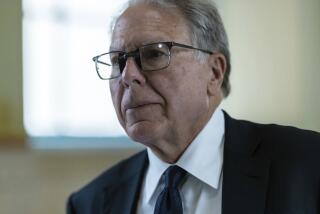Top NRA Official Blames Gun Violence on the White House
- Share via
Despite the string of random gun assaults that continued with this week’s deadly attacks at a Texas church and an Orange County hospital, a top official of the National Rifle Assn. on Friday strongly defended guns and rejected any further efforts to regulate them.
Speaking in Long Beach at a luncheon sponsored by the Claremont Institute, a conservative think tank, Wayne LaPierre, the NRA’s executive director, blamed the increasing violence on the Clinton administration rather than on guns.
Asked in an interview about this week’s church killings by a man who used a 15-shot Sturm Ruger 9-millimeter semiautomatic pistol that he owned legally, LaPierre said no gun law can stop a mentally disturbed man from launching a surprise attack.
“It was a horrible tragedy,” he said. “But it’s very difficult if you have a person that has never committed a crime before and goes insane and decides to commit suicide and take a few citizens with him. It’s very difficult to figure what’s going to stop that.”
Despite coming at the end of an unusually violent week, LaPierre’s appearance generated little controversy among the conservative Claremont group. Rather, the gun advocate received enthusiastic applause, even standing ovations.
LaPierre said the federal government should start filing more gun charges rather than making more gun laws, and he called the Clinton administration’s record on gun prosecutions a “national disgrace.”
He called on President Clinton and Atty. Gen. Janet Reno to crack down on gun violators. He said Clinton “has surrendered our streets to the criminal, and people on them are getting killed every day.”
Representatives for the Justice Department rejected LaPierre’s contention. They argued that federal and state gun prosecutions have risen while the crime rate has declined, and that the Clinton administration has launched a program that seeks to coordinate state, local and federal agencies in efforts to prosecute gun violence.
In criticizing the administration’s prosecution record, LaPierre relied on a recent study by Syracuse University that said federal weapons cases have declined by more than a third since 1992, and criminals convicted of firearm-related crimes are serving shorter prison sentences than in past years.
The study said the gun prosecution rates in California and in many of the cities that have sued gun manufacturers are among the lowest in the country.
LaPierre called on the Justice Department to order all U.S. attorneys to meet a monthly quota of at least 10 gun prosecutions. In high-crime cities, the quota should be raised to 20 prosecutions, he said.
Bea Witzleben, the Justice Department’s gun policy expert, said the administration has launched 60 special prosecution programs in recent years across the country as part of its effort to work with state and local agencies to develop projects suited to local needs.
Gretchen Michael, a Justice Department spokeswoman, also rejected LaPierre’s claims that prosecutions have declined and argued that the Syracuse study failed to count gun charges against violators who were also accused of companion crimes that were more serious than the gun violation.
She said the number of federal prosecutions of gun crimes that resulted in five or more years of imprisonment rose 25% between 1992 and 1996. Moreover, state and federal gun crime convictions rose 22% during that period.
More to Read
Get the L.A. Times Politics newsletter
Deeply reported insights into legislation, politics and policy from Sacramento, Washington and beyond. In your inbox twice per week.
You may occasionally receive promotional content from the Los Angeles Times.










